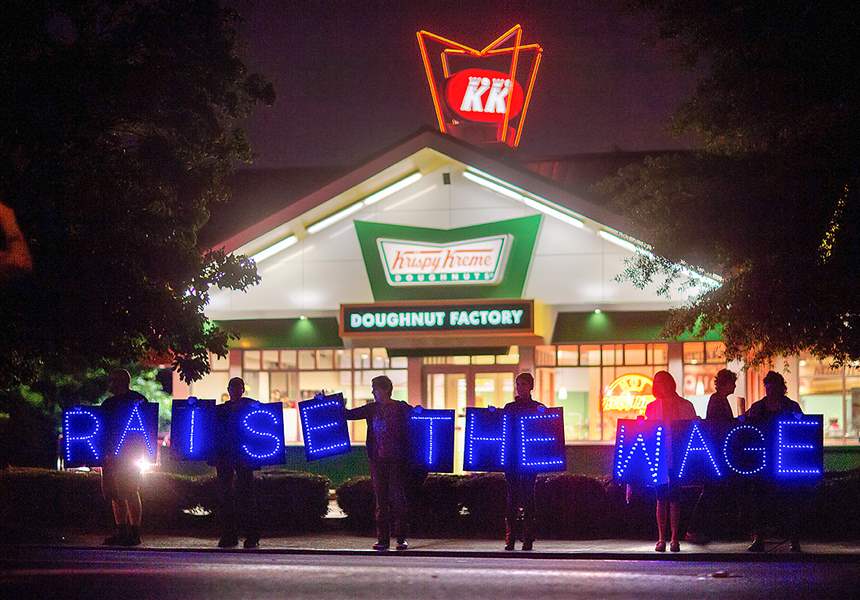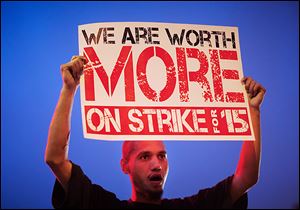
WORKERS SEND A MESSAGE
Rallies nationwide, overseas hit fast-food chains over pay
Fast-food protests spread overseas as organizers intensify pressure
5/16/2014
Fast-food workers and supporters protest low wages outside a Krispy Kreme store in Atlanta. Calling for higher pay and the right to form a union without retaliation, workers protested Thursday as part of a wave of strikes and protests in 150 cities nationwide and 33 countries on six continents.
ASSOCIATED PRESS

Fast-food workers and supporters protest low wages outside a Krispy Kreme store in Atlanta. Calling for higher pay and the right to form a union without retaliation, workers protested Thursday as part of a wave of strikes and protests in 150 cities nationwide and 33 countries on six continents.
NEW YORK — Labor organizers turned up the pressure on fast-food chains to raise worker pay on Thursday, with plans to stage actions in 150 U.S. cities and 33 countries.
The demonstrations build on a campaign by unions to bring attention to the plight of low-wage workers and get the public behind the idea of a $15-an-hour wage.
Industry groups said such pay hikes would hurt their ability to create jobs and note that many of the participants are not workers.
The libertarian Cato Institute said that paying fast-food workers $15 an hour could raise labor costs so much that companies will slash the number of workers and boost menu prices. The right-leaning Employment Policies Institute said that nearly half a million workers nationwide could lose their jobs.
The protests are being backed by the Service Employees International Union and began in New York City in late 2012. Since then, organizers have ramped up actions to keep the issue in the spotlight.
In March, for instance, lawsuits filed in three states accused McDonald’s Corp. of denying breaks and engaging in other practices that deprive employees of their rightful pay. Workers were referred to lawyers by union organizers, who announced protests over “wage theft” the next week.
Organizers said workers nationwide walked off the job on Thursday, including 20 from a restaurant in St. Louis that had to temporarily close as a result. But turnouts have varied and the scope of actions planned for overseas also differed.
In Denmark, McDonald’s worker Louise Marie Rantzau said a collective agreement with McDonald’s in the country prevents workers from protesting the chain. But Ms. Rantzau, who earns about $21 an hour under the deal, and workers planned to demonstrate outside Burger King or other restaurants and post photos on social media.

Antwon Brown, 31, joins other fast-food workers and supporters in a protest in Atlanta. Organizers say the workers’ action forced many restaurants to close for a short time on Thursday.
Images on social media showed workers demonstrating in places including Dublin and Sao Paulo.
In New York City, a couple hundred ralliers beat drums, blew whistles, and chanted in the rain outside a Domino’s pizza store for about a half hour. Local lawmakers, community leaders, and fast-food workers were among those to speak.
“Corporations are able to make money — millions and billions of dollars. We should be able to make a decent salary so we can take care of our families,” said Sheila Brown, a mother of four who works at a KFC.
The campaign has captured media attention as the income gap between the rich and poor has widened and executive pay packages have drawn greater scrutiny.
President Obama has been working to raise the federal minimum wage to $10.10 an hour. The current $7.25 an hour equals about $15,000 a year, assuming a person works a 40-hour week.
Fast-food workers have been viewed as difficult to unionize because many are part-timers who don’t stay on the job. But supporters say that is changing as more people are relying on such jobs to support families.